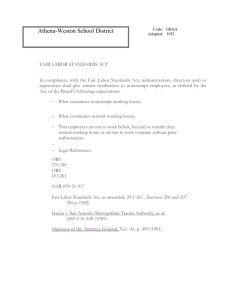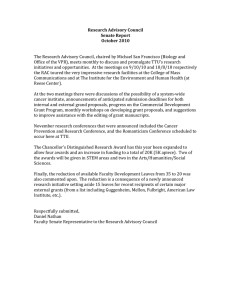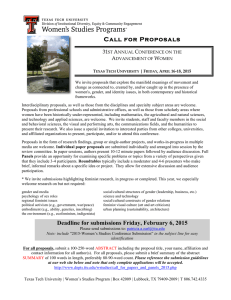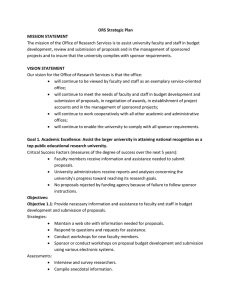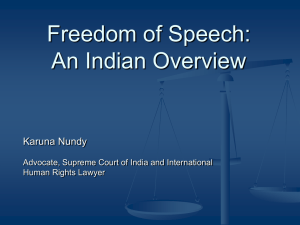Texas Tech University Office of Research Services
advertisement
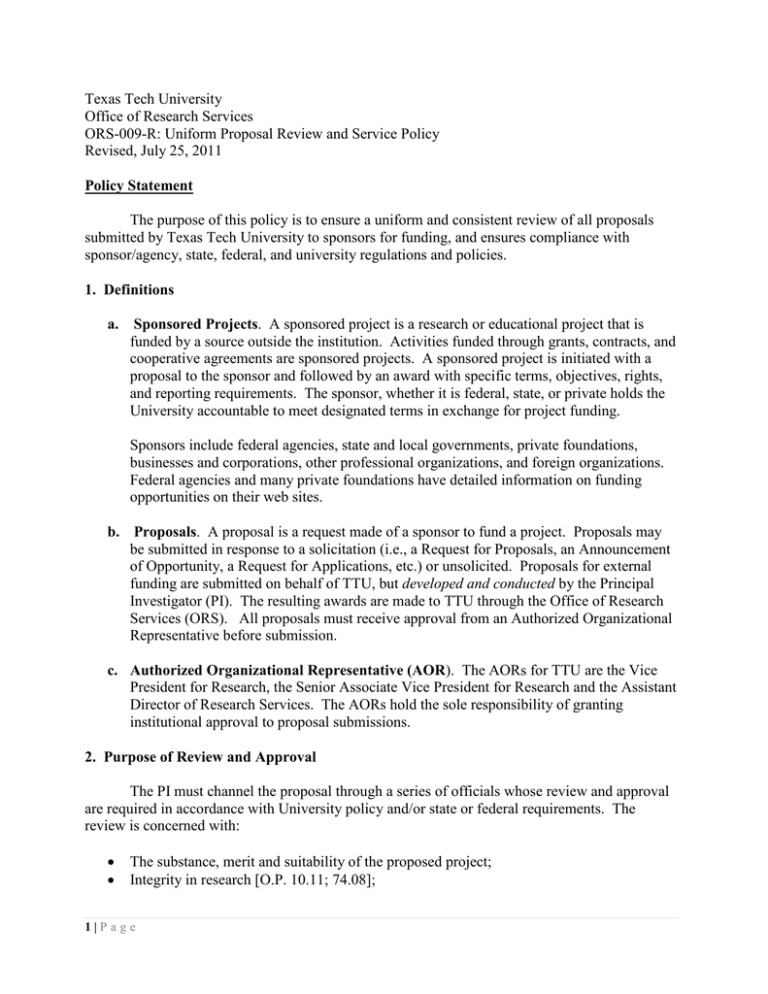
Texas Tech University Office of Research Services ORS-009-R: Uniform Proposal Review and Service Policy Revised, July 25, 2011 Policy Statement The purpose of this policy is to ensure a uniform and consistent review of all proposals submitted by Texas Tech University to sponsors for funding, and ensures compliance with sponsor/agency, state, federal, and university regulations and policies. 1. Definitions a. Sponsored Projects. A sponsored project is a research or educational project that is funded by a source outside the institution. Activities funded through grants, contracts, and cooperative agreements are sponsored projects. A sponsored project is initiated with a proposal to the sponsor and followed by an award with specific terms, objectives, rights, and reporting requirements. The sponsor, whether it is federal, state, or private holds the University accountable to meet designated terms in exchange for project funding. Sponsors include federal agencies, state and local governments, private foundations, businesses and corporations, other professional organizations, and foreign organizations. Federal agencies and many private foundations have detailed information on funding opportunities on their web sites. b. Proposals. A proposal is a request made of a sponsor to fund a project. Proposals may be submitted in response to a solicitation (i.e., a Request for Proposals, an Announcement of Opportunity, a Request for Applications, etc.) or unsolicited. Proposals for external funding are submitted on behalf of TTU, but developed and conducted by the Principal Investigator (PI). The resulting awards are made to TTU through the Office of Research Services (ORS). All proposals must receive approval from an Authorized Organizational Representative before submission. c. Authorized Organizational Representative (AOR). The AORs for TTU are the Vice President for Research, the Senior Associate Vice President for Research and the Assistant Director of Research Services. The AORs hold the sole responsibility of granting institutional approval to proposal submissions. 2. Purpose of Review and Approval The PI must channel the proposal through a series of officials whose review and approval are required in accordance with University policy and/or state or federal requirements. The review is concerned with: • • The substance, merit and suitability of the proposed project; Integrity in research [O.P. 10.11; 74.08]; 1|P age • • • • • • • • • The commitments of faculty and staff time, and possible effects on the teaching or other obligations of the personnel involved, as well as salary arrangements; Adherence to personnel policies; Requirements for and availability of laboratory space and facilities [O.P. 63.08]; The proposed costs of the project and cost sharing that is anticipated and a determination that they have been realistically estimated for reimbursement purposes; Intellectual property [O.P.74.04]; Compliance with sponsor and appropriate federal requirements in addition to University policy and procedures (protection of human and animal subjects, etc) [O.P. 74.11, 60.17, 74.05, 74.09]; Insurance and indemnification; The recovery of both direct and indirect costs [O.P. 65.01]; and University and/or Principal Investigator eligibility. A Shared Responsibility. Each individual noted below has a shared responsibility that should not be overlooked in the preparation and processing of a proposal. This shared responsibility, which begins with the PI, must take into consideration the appropriate time that will be necessary to write, coordinate, review, approve and finally to submit the proposal to the intended sponsor. The sponsor’s established deadline must be taken into account by each individual, but primarily the PI, to allow each subsequent administrative office (i.e., chair, dean, ORS) within the proposal review process suitable opportunity to conduct a proper review according to their assigned responsibilities. “Rush” proposals can reflect not only poor planning or preparation of the proposal, but inadequate–or the absence of–institutional and sponsor required examination prior to submission. 3. Certifications When Signing a Proposal Each person who signs a proposal certifies different responsibilities. The Principal Investigator’s (PI) signature certifies: • An agreement to do all work as proposed; • Any conflicts of interest (financial or other) have been disclosed [O.P. 70.37]; • An agreement to be the overall project manager; • An agreement to abide by all applicable regulations, policies, and procedures related to the project [see Appendix for applicable policies]; and • An agreement to accept responsibility for the scientific and ethical conduct of the project [O.P. 10.11, 74.08]. The Co-Investigator’s (Co-I/Co-PI) signature certifies: • An agreement to do all work as proposed; • Any conflicts of interest (financial or other) have been disclosed [O.P. 70.37]; • An agreement to abide by all applicable regulations, policies, and procedures related to the project [see Appendix for applicable policies]; and • An agreement to accept responsibility for the scientific and ethical conduct of his or her portion of the project [O.P. 10.11, 74.08]. 2|P age The Dean’s/Director’s/Department Head’s signature certifies: • That PI and Co-I/Co-PI work loads are within 100% effort; • That unit resources are available and allocated; • That matching/cost share commitments are authorized and committed; and • That all space requirements for the project can be met. The Office of Research Services’ signature certifies: • That the proposal budget is in compliance with sponsor/agency, state, federal, and university policies, regulations, and standards; • That the proposal review was conducted in accordance with this policy; and • That the proposal passes that review sufficiently to receive institutional approval. The Authorized Organizational Representative’s (AOR) signature certifies that: • TTU has the appropriate facilities, resources, and systems in place to administer and monitor the award in compliance with sponsor/agency, state, federal, and university policies, regulations, and standards; • TTU is committed to the project and agrees to complete the project as proposed if an award is made; and • That all certifications and assurances in the proposal are understood, are true statements, are agreed to, and will be abided by. 4. The Proposal Review Process The following review process is mandatory for all proposals (paper or electronic) originating from TTU departments/centers/institutes/schools and other units before AOR approval will be granted. TTU’s Office of Research Services conducts these reviews. The units will allow 5 business days (at minimum) for proposal review and any necessary revisions before AOR approval. a. Internal Routing Sheet. The Internal Routing Sheet must be completed by the Principal Investigator for all proposals or applications of any kind submitted to outside sponsors that may result in a grant, contract, or other agreement with the University. This form ensures that uniform information about the proposal will be tracked and readily identifiable as the proposal moves through the pre-award and post-award phases. A new form is required each time a proposal is submitted, including, but not limited to, noncompeting continuations and supplements. The form is for internal use only and pertains only to Texas Tech employees. All non-TTU employees’ names should be omitted from the Internal Routing Sheet. The Internal Routing Sheet will be reviewed for accuracy, consistency, and special considerations as outlined: • • Ensure that the PI is authorized to submit the proposal on behalf of TTU; Ensure that the Conflict of Interest statement is signed by all PIs and Co-PIs and Senior Researchers; Identify any research issues (i.e., human or animal subjects, biohazards, or chemical hazards) and verify application and/or approval. • 3|P age • • • • Identify research restrictions (i.e., classified research, export control, restriction on publications, ownership of intellectual property or restrictions on non-residence employment); Identify any matching/cost share and ensure that it is mandatory. All commitments for matching/cost share on federal projects must be allowable per OMB Circular A-21 and conform to all provisions of OMB Circular A-110. TTU as a policy does not allow voluntary cost share; Identify any subawards, and ensure a budget, a statement of work, and a statement of institutional endorsement from each subrecipient’s AOR is included; Ensure that the appropriate facilities and administrative (F&A) rate is applied correctly and that any reductions from the university’s negotiated rates are either required by published sponsor policies or approved as required by university policy (O.P. 65.01). Internal Routing Sheet Signatures. The Internal Routing Sheet should be signed by the PI and all co-investigators. All proposals must be approved by the appropriate department chair(s) or center/institute director(s). Proposals from units that report to a dean (all departments and most centers/institutes) must be approved by the dean or associate dean, if required by the dean’s office. (Note: Dean’s signatures MUST BE obtained in cases where matching/cost-sharing commitments are shown.) ORS will obtain the remaining signatures. b. F&A Discounts. All requests for the voluntary discounting of Facilities and Administrative (F&A) Costs must be made in writing to the Vice President for Research. c. Conflict of Interest Disclosures. Prior to submitting a proposal for funding to any external agency, each investigator shall certify that he or she has disclosed any significant financial interests (including those of a spouse and dependent children) that would reasonably appear to be affected by the project for which funding is sought and the unit head shall certify that, based on the investigator’s disclosure, either (1) no conflicts of interest exist or (2) existing conflicts will be managed, reduced to an acceptable level, or eliminated prior to expenditure of funds under the award. These certifications shall be made by signing the Internal Routing Sheet for Sponsored Projects. The University Operating Policy that governs Conflicts of Interest is 70.37. d. Proposal Abstract and Body Review. The proposal abstract and body will be reviewed as outlined: • • • Ensure completeness of the proposal package per the sponsor’s guidelines (if applicable); Ensure the format of the proposal package follows the sponsor’s program announcement (if applicable); Review the abstract, project description, and/or budget justification to identify any potential research compliance issues outlined in Section 4.a. above. e. Budget Review. The proposal budget will be reviewed as outlined: • Ensure correct addition of the budget totals; 4|P age • • • • • • • • • • • • • Ensure dollar amounts are consistent throughout the proposal text, Internal Routing Sheet, cover page, budget and current and pending support (if applicable); Ensure items are in the correct budget categories and are direct or indirect costs; Ensure that all planned costs are allowable under sponsor and university policies; Ensure that salaries have been calculated correctly for faculty, staff, and students; Ensure that appropriate fringe benefits rates have been calculated correctly and that the use of projected rates has been disclosed in the budget narrative/justification; Ensure that tuition remission has been included for graduate student research assistants employed during the academic school year, if allowed by the sponsor; Ensure that travel categories have been identified (domestic/international), that trips are listed separately, and that the correct per diem rates are applied; Ensure that a budget narrative/justification has been included with the proposal package; Ensure that budget narrative/justification corresponds to the budget and supports the scope of work; Ensure that modified total direct costs (MTDC) has been calculated correctly; Ensure that F&A recovery is calculated properly; Ensure that the correct F&A rate is being used per TTU’s negotiated agreement, the sponsor’s guidelines, and/or pursuant to any waiver granted; Ensure any instances of matching/cost share, subawards, or reduced F&A are identified/addressed as outlined in Section 4.a. above. f. Proposal Problems. Problems that arise with a proposal during review will be addressed with the PI and/or the unit’s representative in order to resolve them in a timely manner. If the problems are not solved sufficiently to pass review, the proposal will be returned to the PI and/or unit representative with an explanation, a time frame and potential solution(s) to remedy the problems. Proposals that are not corrected within the deadline for submission run the risk of not being submitted on time. Problems will be documented and kept with the copy of the proposal to be archived as a record that all problems have been resolved before AOR approval, proposal submission, or setup of award. 5. ORS Service Policy Deadlines a. Paper Submissions. Some funding agencies still utilize paper for submission of grant applications. All proposals, whether paper or electronic, should allow 5 business days for the proposal review as outlined above. Preparation of Forms. Frequently, an application will involve the preparation of standard forms. The Office of Research Services can answer questions about any institutional details to be included on the forms. This includes the verification of assurances required by funding agencies. The information can also be found on the ORS website. Additionally, with sufficient advance notice, ORS staff will be able to complete all 5|P age electronic forms, convert text to PDF files, including uploading documents to the electronic forms, and assist with other large scale proposal corrections. Copying and Mailing Services. After a proposal has been routed and reviewed,ORS will provide (and pay for) normal proposal duplication. This includes the number of copies required by the agency as well as one copy to the PI. This does not include duplication of photographs or color copies. After the copies have been assembled ORS will transmit the proposal to the agency. All proposals are securely packaged to protect against damage during shipment and sent via second day air express. This permits verification of receipt of the proposal by the agency. FedEx is one of the most reliable ways of getting a proposal to an agency overnight. ORS recommends this method if a proposal must be received by the agency within four (4) working days of the mailing date. Please note that ORS cannot pay for overnight express; it is cost prohibitive considering the large number of proposals sent in this manner. However, if the PI will provide a University fund organization program (FOP), ORS will handle all other details. b. Electronic Submissions. Some funding agencies that utilize an electronic application process are not aware of University policies and will ask investigators to follow a submission procedure that bypasses the required University approval process outlined above. To protect the interests of TTU faculty and staff who submit proposals as well as the interests of the University, on-line or other electronic versions (including e-mail) of proposals must be processed in the same manner as paper submissions. The proposal review process is outlined above. There are two types of electronic submissions. Those proposals submitted by ORS and those submitted directly by the PI. Internet Submissions (Grants.gov, FastLane, etc) by ORS. Proposals that must be electronically submitted by ORS via the internet require extra processing. Electronic submissions are subject to barriers that may not occur with traditional paper submissions. Therefore, ORS must adopt a fairly strict policy for such applications. The investigator must follow the routing process as outlined above. The established time requirements provide an opportunity to review the submission for necessary files, repair corrupted files, and overcome internet service interruptions which could otherwise result in failure to get the proposal submitted to the sponsor on time. Given sufficient time, the ORS staff can avoid sponsor overload on deadline day and problems beyond ORS’s control such as corrupted files or internet service interruptions which could result in proposals not being submitted prior to the deadline. A PI who waits until the last minute to work on and submit an electronic proposal runs the risk of missing the deadline. Electronic Submissions Direct to Sponsor by PI. There are occasions when an agency will ask a proposal be sent via electronic means directly from the investigator to the agency. In 6|P age some cases, funding agencies still require an “official” copy, signed by the Authorized Organizational Representative (AOR) to be sent later. If the proposal has already been submitted prior to any University review and approval, the proposal is not considered an authorized application. Electronic applications submitted by investigators must follow the same proposal review process as outlined above. After obtaining the required university approvals, including final approval by ORS, the investigator may then follow the sponsor’s submission procedure. If any changes are made to the proposal being sent to the sponsor, the new version must be forwarded to ORS. A PI who is submitting a proposal to an agency that requires direct submission of an electronic version should contact ORS to discuss how this should be done within the current university policies. Note: Since many agencies are in the process of implementing or modifying their electronic submission process/guidelines, it is imperative that the PI carefully review the agency’s guidelines for proposal submission and contact ORS with any questions. 6. Quality Assurance Review The goal of the Quality Assurance Review is to have zero proposals rejected by the sponsor due to an error or missing documentation in the submitted proposal. ORS has implemented a ten point quality assurance review (QAR) process of the proposal that is performed by a second ORS staff member prior to submission. The QAR process will include review of the budget, cost sharing, compliance issues as well as the accuracy of the technical and non-technical components to insure compliance with university and sponsor regulations. The PI is to be informed during proposal preparation that quality assurance review will be done only if the proposal is submitted to ORS, in its final form, five business days before the sponsor deadline. 7. TTU Rights Regarding Proposals and Awards a. Late Proposals. If proposals are not received with sufficient time for review, proposal compliance with sponsor guidelines and an “on-time” submission cannot be guaranteed. Investigators are reminded that ORS will follow the “First-In/First-Out” method of processing proposals. Every attempt will be made to submit proposals that are received in the office with fewer than 5 business days for review. A PI who waits until the last minute to work on and submit a proposal runs the risk of submitting an incomplete or incorrect proposal or missing the deadline. Proposals that are submitted that do not allow sufficient time for review may be authorized and submitted solely at the AOR’s discretion, with the stipulation that a full review will take place after submission. The TTU administration reserves the right to 7|P age withdraw the proposal at any time and/or decline any award made on the proposal if any issues of non-compliance or other serious problems are discovered that place Texas Tech University at financial or legal risk. b. Unauthorized Proposal Submissions. Texas Tech University only authorizes proposal submissions with ORS approval. If a proposal is submitted to the sponsor without ORS approval, the full proposal package must still be reviewed. If the proposal does not pass review, it will be withdrawn. Any award granted as a result of an unauthorized proposal submission may be declined at TTU’s discretion. 8|P age Appendix: Research Policies at Texas Tech University ORS Policies Joint Statement: Office of Research Services and Office of Development Disclosure Statement Regarding Conflict of Financial Interests Responsibility of All Non-faculty Research Personnel Policy on Waivers of F&A (not active) Prohibition of Purchase of State Vehicles Graduate Student Tuition/Fee Assistance Program Limited Proposal Submissions (not active, contact OVPR/Development) Uniform Proposal Review and Service Policy (revised 7/25/2011) ORS-001 ORS-002 ORS-003 ORS-004 ORS-005 ORS-006 ORS-008 ORS-009R Texas Tech (Research-Related) Operating Policies Allegations of Misconduct in Research or Scholarly Activity Animal Care and the Institutional Animal Care and Use Committee (IACUC) Budgeting Sponsored Projects Budgeting Sponsored Projects Prior to Receipt of Award Chemical Hygiene Plan Collecting Objects on State or Federal Land Conditions of Grants and Consulting Contracts Made Directly to Individuals Conduct of Research and Scholarly Activity Conflict of Interest Copyright Royalty Income Copyrightable Inventions, Publications, etc. Cost Transfers to Sponsored Projects or to Matching Accounts for Sponsored Projects Direct Charging to Sponsored Projects and Cost Share Funds Disposition of Patent and Copyright Royalty Income Effort Commitment and Certification Equipment Purchased for Sponsored Federal Projects Ethics Policy Facilities and Administrative Cost Recovery from Sponsored Projects Fixed Price Agreements Grants, Processing, Management, and Publicity, from Private Philanthropic Sources Identification Cards for Visiting Scholars Institutional Base Pay Institutional Biosafety and Hazardous Materials Committee Intellectual Property Rights Office of Research Services Patentable Material Professional Services (non-TTU Personnel) Program Income Generated by Federally-funded Projects Protection of Human Subjects in Research Radioactive Materials, Radiation Producing Devices and Lasers Research and Scholarly Activity 9|P age 74.08 74.11 65.09 65.10 60.17 74.03 65.06 74.02 70.37 74.06 74.04 65.04 65.08 74.06 65.02 63.08 10.11 65.01 65.00 02.04 74.07 74.16 74.05 74.04 74.01 74.04 72.04 65.03 74.09 60.11 74.02 Sub-recipient Monitoring TTU Policy on Prostitution and Sex Trafficking TTU Safety Committees University-recognized Centers and Institutes 10 | P a g e 65.05 74.15 74.13 74.14
